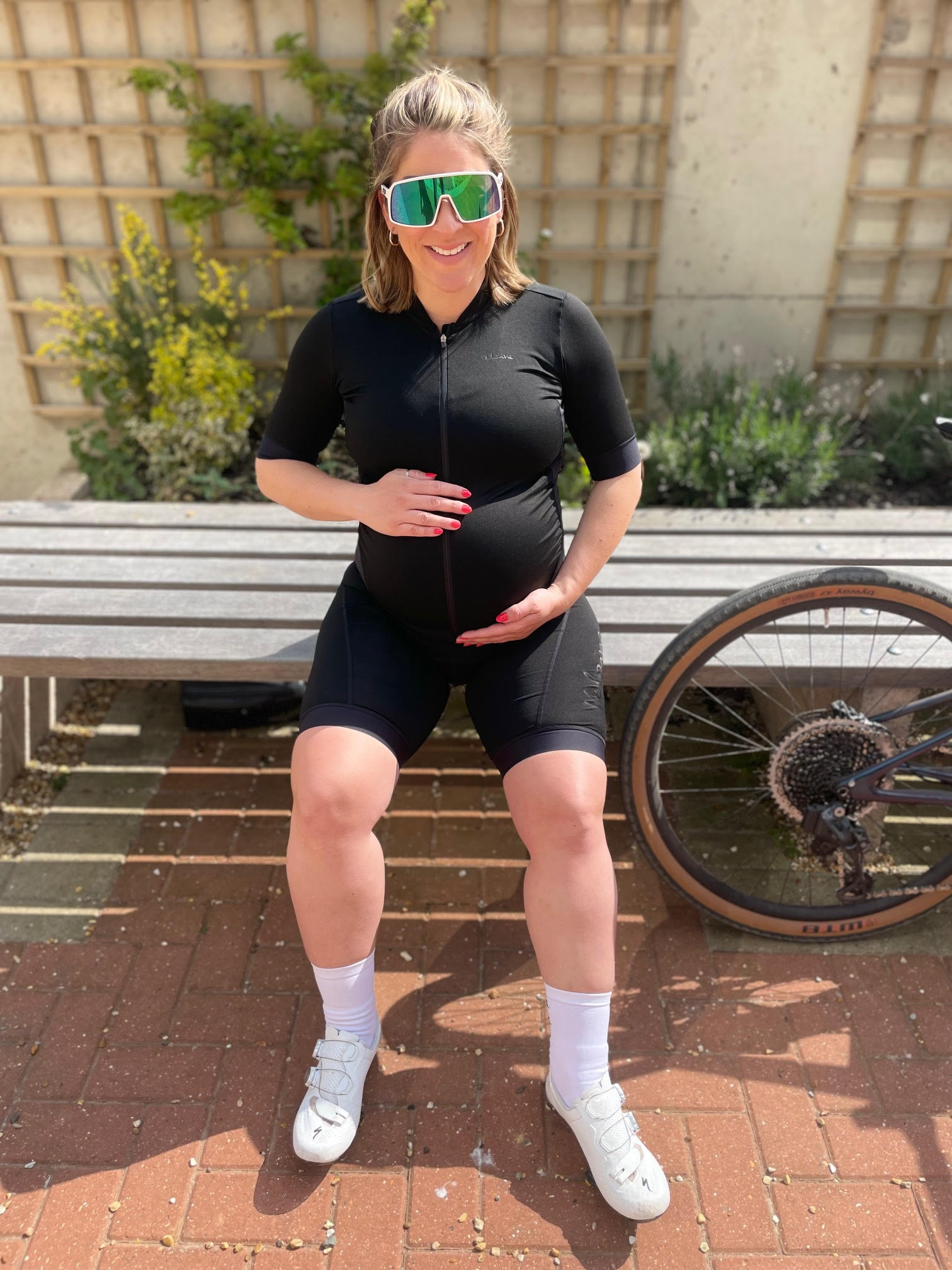
Most of us have busy lives, packing in cycling alongside work, family commitments and more - making 'quick wins' extremely inviting. But, do they work? In our weekly series we speak to cyclists of all kinds, to find out what one change they've made that's helped to make them a better bike rider - and ask - will it work for you?
Rebecca Charlton is a TV presenter, journalist, commentator and author, but is probably best known for presenting on Eurosport, and providing ITV's coverage of the OVO Energy Women's Tour of Britain and Tour of Britain.
She has cycled all of her life and is a strong advocate and positive role model for believing that everybody belongs on a bike.
As a new parent, juggling family and work commitments, Charlton admits that finding time to ride has at times felt like a chore, but her top tip for anyone else in a similar position is to simply write down how cycling makes you feel, then stick it up where you can see it.
Just one small change: Write down your why

"Find your reason for setting the alarm early, or getting kitted up when everyone else is readying themselves for a Netflix binge, write it down and leave it where you can see it daily," says Charlton.
Asking what motivates her to get out on the bike, Charlton candid answer is incredibly inspirational: "When I stopped racing bikes, a lot of people would ask me why I was riding or what I was training for and I didn’t really have an answer, but when I fell pregnant with my daughter I was determined to keep as fit as possible, so after consulting the experts I rode on Zwift most days up until 40 weeks.
"I ended up having some complications in labour that meant I was very unwell in hospital afterwards and monitored closely. The surgeon predicted how long I would stay in for and I more than halved that recovery time, which the medical experts attributed to the fact that I had trained throughout the pregnancy.
The benefits of exercise during pregnancy - for mother and baby - are well documented. Speaking to Cycling Weekly, Dr Sarah Rollins, who worked as a consultant to devise the guidelines used by the Ministry of Defence’s (MOD) personal trainers, when coaching women during pregnancy said: “Staying active is good for you, it’s good for the baby, and it’s good for the mind."
"This gave me a huge reminder that we don’t always cycle to win a bike race, or take on the world's toughest sportive. We may be looking to boost our physical or mental health for a plethora of personal reasons that will improve your resilience and quality of life.
"Cycling is powerful and I think it’s really important and useful to remind yourself why you’re squeezing in that extra session when you really feel that you don’t have time."
There's no denying the impact cycling has had on Charlton's life, and how grateful she is for it assisting her swift recovery. But can writing down your own motivation really help anyone off the sofa and out the front door?
Experts view

To find out if writing a note to yourself could really help you put on your bike shoes, I spoke to Amanda Daley, Professor of Behavioural Medicine at Loughborough University and Director of the Centre for Lifestyle Medicine and Behaviour. Daley is a Chartered Psychologist, a Registered Psychologist and a NIHR Research Professor in Public Health communicating to the public the importance of making healthy lifestyle choices.
"Writing down your goals can certainly help you by acting as a prompt and reminder of what you are trying to achieve," Daley tells me. "It can also help you to understand exactly the direction you are heading," she says, before before adding that writing down your ‘why’ can also "make it real and concrete," rather than have it swilling around in your head.
When asking specifically about Charlton’s suggestion that she finds writing down her motivation to get on the bike, even when she least feels like it, Daley notes: "A good way to look at it is to think that writing it down is a way of creating a map to your destination or where you want to be."
According to Daley it’s the very act of writing down your reasons for being active that commits you to showing up. "It helps you to hold yourself to account which can be a source of commitment leading to greater motivation," she says, before agreeing that putting pen to paper also can help when you find yourself diverting from your goals.
"This can boost your confidence and motivation because it brings a sense of purpose" explains Daley, who advocates for writing down how exercising will make you feel.
"This is often linked to [your] mental health" she says "and wanting to feel a sense of achievement, which then leads to more motivation to go on an do something else, so it can be cyclic."

According to Daley, from a cognitive perspective, it's the thinking about and planning where and when you are going to do something to achieve your goals that is the important bit, and having a visual reminder is key.
So while a written note works for Charlton, something like leaving your bike kit out, or committing to meeting someone will help with you sticking to your goal. Daley’s research has shown that social support is very important for achieving activity goals, especially in terms of accountability.
Rewards can also be good for motivation, so when you do well give yourself a reward – you have earned it!
I'm beginning to understand that part of the importance of writing it down is that it triggers an instinctive accountability.
Of course, once you've written it down, you can even share it with others for even more encouragement to get on your bike and head out for a ride, an act that Daley is firm believer in.
"It can act as a prompt for conversation between yourself and others," Daley says. "Also, when you share your written goals with someone," Daley adds, "it means you are accountable to them, but in a positive way rather than a nagging way. We call this external accountability. When we know people are routing for us, we are more likely to stick to our goals.
"When we know we are accountable to others who are supporting or championing our goals" explains Daley, "it can really help with motivation, particularly on the days when it's low or the goals don’t feel achievable."
Ok, so we now know that writing down your why can be incredibly motivating, but does this help with adopting a lifestyle change in the long term?
“Yes” Daley answers instantly, “once it becomes habitual, it’ll become automatic in that you don’t think about the behaviour anymore you just do it.
“Most people don’t think about or even remember brushing their teeth in the morning, it’s just integral to daily life that the cognitions surrounding doing it are low.
"This is what we are trying to achieve with physical activity, we want it to just be a usual part of daily life," before adding the key to it all is making sure the behaviour you want to make is sustainable.
The evidence for small bite size changes is so compelling that Daley, as part of Loughborough University, in partnership with the Universities of Birmingham, Leicester, Edinburgh, and Birmingham Community Healthcare Foundation NHS Trust, have been awarded a £2.2 million grant to develop a new approach to promoting physical activity called ‘Snacktivity’.
The aim of this approach is to promote small or ‘bite’ size bouts of physical activity accumulated throughout the whole day, breaking it down into lots of short activity snacks so that it is easier to make progress.
"This is where the small change approach comes in," says Daley "small changes are much easier to integrate into your life to become habits as the demand on you is typically low. We often say, ‘for the long haul, start small’.
"We have completed lots of studies at Loughborough University using the small change approach for promoting participation in physical activity and for weight management. A small change approach can be useful in helping people to keep their motivation high, which is important when goals might take a long time to achieve."
Daley says that writing down your motivations in addition to the Snacktivity approach, can help reduce feeling daunted about starting to become more active.
Smaller chunks approach will help with behaviour change and habit formation, which are best achieved through the gradual building of confidence, celebrating small successes along the way.
Our view
I have to admit that I've always been a little hesitant of 'putting it out there' approach to goal setting, feeling far too vulnerable to deal with the repercussions of failure.
However, this approach to writing down my 'why', and how it makes me feel is a really appealing approach to accountability.
I think unknowingly I've been using this visual form of motivation by putting kit on, or by the door, but I've never actually written it down. Knowing that I can simply write 'feel de-stressed and happy' on a post-it note rather than a less appealing 'go for a ride' makes me far more inclined to get behind the concept.







